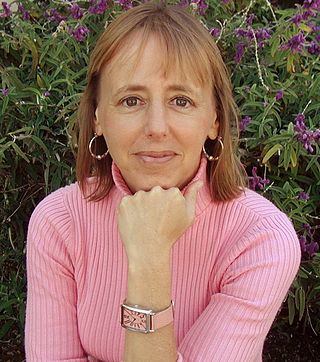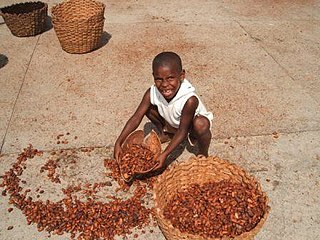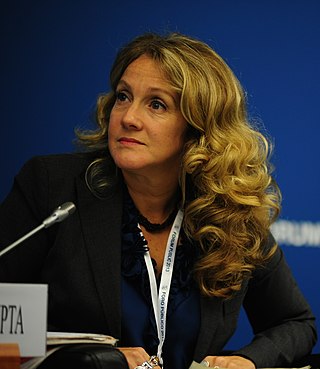
Fair trade is a term for an arrangement designed to help producers in developing countries achieve sustainable and equitable trade relationships. The fair trade movement combines the payment of higher prices to exporters with improved social and environmental standards. The movement focuses in particular on commodities, or products that are typically exported from developing countries to developed countries but is also used in domestic markets, most notably for handicrafts, coffee, cocoa, wine, sugar, fruit, flowers and gold.

The Hershey Company, often called just Hershey's, is an American multinational company and one of the largest chocolate manufacturers in the world. It also manufactures baked products, such as cookies and cakes, and sells beverages like milkshakes, as well as other products. Its headquarters are in Hershey, Pennsylvania, United States, which is also home to Hersheypark and Hershey's Chocolate World. It was founded by Milton S. Hershey in 1894 as the Hershey Chocolate Company, which was a subsidiary of his Lancaster Caramel Company. The Hershey Trust Company owns a minority stake but retains a majority of the voting power within the company.

The 1999 Seattle WTO protests, sometimes referred to as the Battle of Seattle, were a series of anti-globalization protests surrounding the WTO Ministerial Conference of 1999, when members of the World Trade Organization (WTO) convened at the Washington State Convention and Trade Center in Seattle, Washington on November 30, 1999. The Conference was to be the launch of a new millennial round of trade negotiations.

Trade justice is a campaign by non-governmental organisations, plus efforts by other actors, to change the rules and practices of world trade in order to promote fairness. These organizations include consumer groups, trade unions, faith groups, aid agencies and environmental groups.

Medea Benjamin is an American political activist who was the co-founder of Code Pink with Jodie Evans and others. Along with activist and author Kevin Danaher, she created the fair trade advocacy group Global Exchange. Benjamin was the Green Party candidate in California in 2000 for the United States Senate.
Direct Action Network (DAN) was a North American confederation of anti-corporate, anti-authoritarian and anarchist affinity groups, collectives, and organizations. It grew out of the Seattle chapter which had been formed to coordinate the nonviolent civil disobedience portion of the anti-WTO mobilization in Seattle in 1999.

Scharffen Berger is an American chocolate manufacturing company, which was a subsidiary of The Hershey Company after it had been acquired in 2005. Scharffen Berger was established as an independent Berkeley, California-based chocolate maker in 1996 by sparkling wine maker John Scharffenberger and physician Robert Steinberg.

Child labour is a recurring issue in cocoa production. Ivory Coast and Ghana, together produce nearly 60% of the world's cocoa each year. During the 2018/19 cocoa-growing season, research commissioned by the U.S. Department of Labor was conducted by NORC at the University of Chicago in these two countries and found that 1.48 million children are engaged in hazardous work on cocoa farms including working with sharp tools and agricultural chemicals and carrying heavy loads. That number of children is significant, representing 43 percent of all children living in agricultural households in cocoa growing areas. During the same period cocoa production in Cote d’Ivoire and Ghana increased 62 percent while the prevalence of child labour in cocoa production among all agricultural households increased 14 percentage points. Attention on this subject has focused on West Africa, which collectively supplies 69% of the world's cocoa, and Côte d'Ivoire, supplying 35%, in particular. The 2016 Global Estimates of Child Labour indicate that one-fifth of all African children are involved in child labour. Nine percent of African children are in hazardous work. It is estimated that more than 1.8 million children in West Africa are involved in growing cocoa. A 2013–14 survey commissioned by the Department of Labor and conducted by Tulane University found that an estimated 1.4 million children aged 5 years old to 11 years old worked in agriculture in cocoa-growing areas, while approximately 800,000 of them were engaged in hazardous work, including working with sharp tools and agricultural chemicals and carrying heavy loads. According to the NORC study, methodological differences between the 2018/9 survey and earlier ones, together with errors in the administration of the 2013/4 survey have made it challenging to document changes in the number of children engaged in child labour over the past five years.

The International Labor Rights Forum (ILRF) is a nonprofit advocacy organization headquartered in Washington, D.C., U.S., that describes itself as "an advocate for and with the working poor around the world." ILRF, formerly the "International Labor Rights Education & Research Fund", was founded in 1986, and the organization's mission statement reads: "ILRF believes that all workers have the right to a safe working environment where they are treated with dignity and respect, and where they can organize freely to defend and promote their rights and interests. ILRF works to develop practical and effective tools to assist workers in winning enforcement of protections for their basic rights, and hold labor rights violators accountable."
Green America is a nonprofit membership organization based in the United States that promotes environmentally aware, ethical consumerism. Founded in 1982, by Paul Freundlich, The approach of helping consumers find environmentally compliant companies in the marketplace. Green America provides businesses with the Green America Seal of Approval, after completing Green America's screening process and have been approved to be listed in their National Green Pages directory. The Green America Approved seal is given to applicant businesses that operate in ways that support workers, communities, and protect the environment.

Since its creation in 1995, the World Trade Organization (WTO) has worked to maintain and develop international trade. As one of the largest international economic organizations, it has strong influence and control over trading rules and agreements, and thus has the ability to affect a country's economy immensely. The WTO policies aim to balance tariffs and other forms of economic protection with a trade liberalization policy, and to "ensure that trade flows as smoothly, predictably and freely as possible". Indeed, the WTO claims that its actions "cut living costs and raise standards, stimulate economic growth and development, help countries develop, [and] give the weak a stronger voice." Statistically speaking, global trade has consistently grown between one and six percent per annum over the past decade, and US$38.8 billion were allocated to Aid for Trade in 2016.
A sustainability organization is (1) an organized group of people that aims to advance sustainability and/or (2) those actions of organizing something sustainably. Unlike many business organizations, sustainability organizations are not limited to implementing sustainability strategies which provide them with economic and cultural benefits attained through environmental responsibility. For sustainability organizations, sustainability can also be an end in itself without further justifications.
The Martin Luther King, Jr. County Labor Council (MLKCLC) is the central body of labor organizations in King County, Washington. The MLKCLC is affiliated with the national AFL–CIO, the central labor organization in the United States, which represents more than 13 million working people. Over 125 organizations are affiliated with the MLKCLC, and more than 75,000 working men and women belong to Council-affiliated organizations. Not only does the MLKCLC support labor organizations, but it acts as a voice for the interests and needs of the working people in King County, WA.

Fair trade cocoa is an agricultural product harvested from a cocoa tree using a certified process which is followed by cocoa farmers, buyers, and chocolate manufacturers, and is designed to create sustainable incomes for farmers and their families. Companies that use fair trade certified cocoa to create products can advertise that they are contributing to social, economic, and environmental sustainability in agriculture.
Economic globalization is one of the three main dimensions of globalization commonly found in academic literature, with the two others being political globalization and cultural globalization, as well as the general term of globalization. Economic globalization refers to the widespread international movement of goods, capital, services, technology and information. It is the increasing economic integration and interdependence of national, regional, and local economies across the world through an intensification of cross-border movement of goods, services, technologies and capital. Economic globalization primarily comprises the globalization of production, finance, markets, technology, organizational regimes, institutions, corporations, and people.
Anti-corporate activism is activism directed against the private sector, particularly larger corporations. It is premised on the belief that the activities and impacts of big business are detrimental to the good of the public and democratic process.

Alter-globalization (also known as alternative globalization or alter-mundialization—from the French alter-mondialisation—is a social movement whose proponents support global cooperation and interaction, but oppose what they describe as the negative effects of economic globalization, considering it to often work to the detriment of, or to not adequately promote, human values such as environmental and climate protection, economic justice, labor protection, protection of indigenous cultures, peace and civil liberties. The movement is related to the global justice movement.

Deborah James is an American activist. She is director of international programs at the Center for Economic and Policy Research (CEPR) and is on the Board of Directors of Global Exchange. Prior to her work for CEPR, James had been called "a top U.S. protest organizer" by the Center for Public Integrity. She was formerly the Director of the WTO Program at Public Citizen's Global Trade Watch, the Global Economy Director at Global Exchange, and the Executive Director of the Venezuela Information Office.

Organic chocolate is chocolate which has been certified organic. As of 2016, it was a growing sector in the global chocolate industry. Organic chocolate is a socially-desirable product for some consumers. Major brands, such as The Hershey Company, have begun to produce organic chocolate.

Showdown in Seattle: Five Days That Shook the WTO is a 1999 documentary film, first broadcast in daily half-hour installments, about the November 1999 protests against the Ministerial Conference of the World Trade Organization (WTO) in Seattle, Washington.













